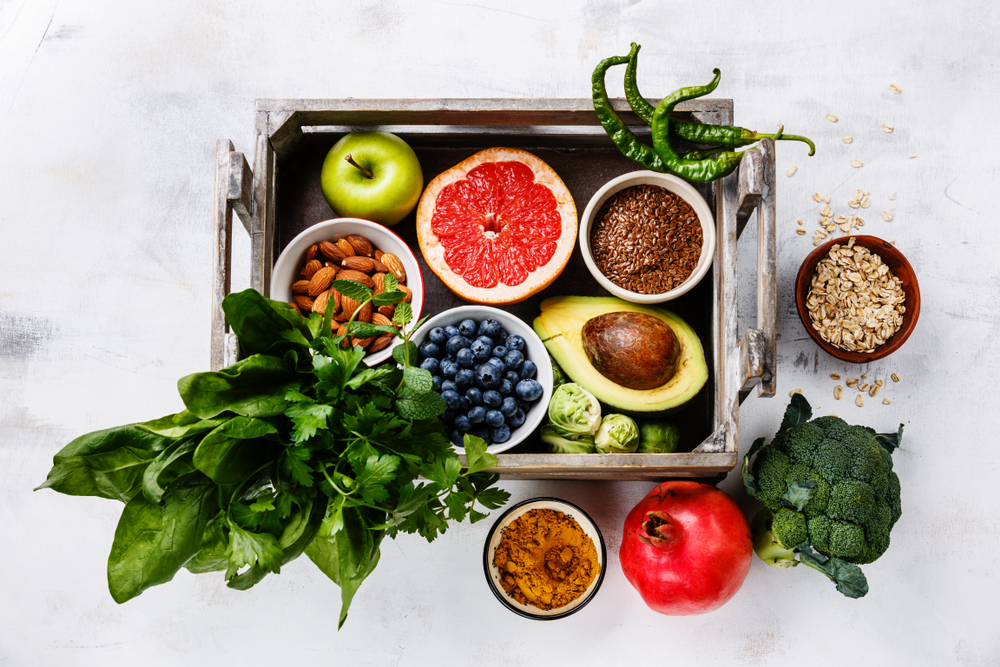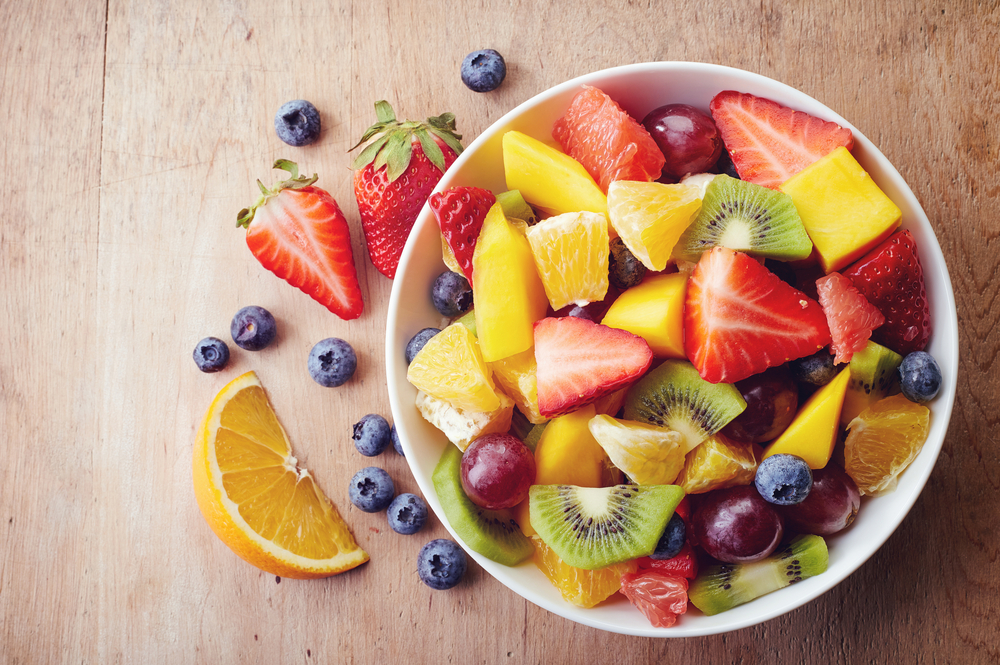By: Sue Pasqual
Increasing one’s antioxidant intake is a great option when you’re looking to support optimum wellness, especially in today’s highly chemical and polluted world. The average body just can’t keep up the antioxidant balance on its own, so a good amount of them must come from the foods and supplements you choose to include in your daily diet. Now, this doesn’t mean that antioxidants are the ultimate fix-all, but that leaves many of us asking what are the benefits of antioxidants?
What Are The Benefits of Antioxidants?
First things first – antioxidants are substances that inhibit oxidation, especially ones used to counteract the deterioration of stored food products. These antioxidants occur naturally in many plant-based foods such as fruits, vegetables, coffee, tea, wine and chocolate. However, many of these are grown in environments that are exposed to chemicals which, of course, counteracts the benefits of antioxidants that we would be adding them for in the first place!
Antioxidants are thought to have far-reaching, positive effects on cardiovascular health, pulmonary health, and the immune system, but it all starts with one thing: cellular health. The chief role of antioxidants is to stabilize free radicals to support cell health. On a cellular level, antioxidants:
- Promote a healthy cell cycle.
By combating free radicals that create unstable cells and spread like a chain reaction, antioxidants help support normal cell cycles and cell integrity.* - Cellular health.
Antioxidants may help maintain cellular health by helping our bodies’ ability to distinguish healthy cells from those that have been impacted by free radicals.* - Apoptosis.
Resveratrol, which is an antioxidant found in red wine, promotes apoptosis (programmed cell death) in unhealthy cells. Programmed cell death can potentially minimize the spread of free radicals to healthy cells.*
What Are Free Radicals?
The most important thing to know about free radicals is this:
“A free radical,” according to the National Center for Complementary and Integrative Health, “is an unstable atom or group of atoms that tries to stabilize itself by latching onto a healthy atom. This creates a domino effect, as the healthy atom becomes unstable, and in turn, latches on to the next healthy atom.”
The result is a chain reaction of atoms turning one another into free radicals which affect us on a cellular level. Oxidative stress is what happens when your body produces more free radicals than it can counteract. Normally, our bodies can counteract this chain reaction, helping more atoms to stay in a stable state and thus promoting cell integrity. However, if too many free radicals are being produced, or we have a deficiency of antioxidants, the body may not be able to provide the necessary protection.
Taking measures to counteract them promotes cellular health and may potentially offset some of the negative effects of free radicals on your body!
How Are Free Radicals Formed?
As we mentioned, free radicals form when the atoms of our cells become unstable. This occurs when an atom loses an electron in its outermost shell and begins scavenging the body to steal electrons from other stable atoms. We’re exposed to free radicals in different ways, including:
- Normal metabolic processes, such as converting sugar into energy or digesting food,
- Exercise, or
- Pollutants and harmful substances.
Stress, exercise, exposure to harmful substances like alcohol or cigarettes–these all contribute to free radical formation. Excessive free radical activity in the body can impact cellular health, which may contribute to some issues like premature aging and other challenges.
Putting It Together
We can’t avoid exposure to free radicals, but antioxidants may help combat them. Many studies on specific antioxidants have found they offer health benefits, but remember they are supplemental to a healthy way of living! Antioxidants can go a long way in helping support your body as you age, plus all of the antioxidant-rich foods are also loaded with nutrients to balance your wellbeing.
Several antioxidants contain certain ingredients that have antioxidant properties such as vitamin C, but what does that mean? Even more importantly, what do antioxidants really do?
The National Center for Complementary and Integrative Health says that antioxidants are substances that promote cellular health. They do this, like we mentioned, by protecting the body from free radicals. Oxygen free radicals—or, free radicals formed by unstable oxygen molecules—are the most common type that we can be exposed to, and antioxidants act as scavengers that seek out these unstable molecules to pair electrons to the atom’s outer shell, effectively neutralizing them.
Where do Antioxidants Come From?
Antioxidants are found in the foods mentioned can also be introduced into the body through dietary supplements. Dietary supplements are a great way to supplement your intake of antioxidants, but even if you eat plenty of antioxidant-rich foods, dietary supplements can still be beneficial in combating free radicals.
Vitamins
Some vitamins are antioxidants. Vitamin C, in particular, is one of the most popular and multipurpose vitamins in the world. Vitamin C helps support cardiovascular health and may promote normal pulmonary health. Furthermore, it’s rich in ascorbic acid, a powerful and water-soluble antioxidant.*
Vitamin C is found in a plethora of citrus fruits, peppers, greens, and other fruits and vegetables. It’s recommended that we consume five servings of Vitamin C rich fruits and vegetables per day. This may not always be feasible, and that’s where Vitamin C supplements come in.*
Fruit Extracts
Fruits are highly rich in numerous antioxidants, such as anthocyanins and flavonoids. Flavonoids are complex organic compounds found in almost all plants and have long been thought to have powerful antioxidant properties.
Bioflavonoids are a key ingredient to many products. Bioflavonoids, in particular, are chemicals that act as a light filter, protecting chains of DNA by absorbing ultraviolet radiation. As antioxidants, they have been shown to support cardiovascular health and cell vitality.*
Oligomeric proanthocyanidins (OPCs) are bioflavonoids that have an extraordinary nutritional benefit and provide powerful antioxidant protection.* Flavonoids can be extracted from a wide array of fruits and fruit products, including citrus, berries, and even red wine. Grape seed extract, and that of the skin stalk, and vine, which comprise red wine extract, are high in OPCs.* Various types of berries are known to contain high levels of polyphenols and anthocyanins. Fruits such as blueberries, cranberries, raspberries, plums, grapes, pomegranates, and more.*
Bark Extracts
Tree bark is another powerful source of antioxidants. The maritime pine tree, which only grows on the coast of Southwest France, contains high levels of the antioxidant Pycnogenol®. Pycnogenol® is effective in combating free radicals, attaching to them to reduce the amount of oxidative stress on the body. Pycnogenol® promotes cardiovascular health, normal blood vessel dilation, and other incredible benefits.*
For more information on antioxidants, check out our blog post here!
*These statements have not been evaluated by the Food and Drug Administration. This product is not intended to diagnose, treat, cure, or prevent any disease.





Comments (0)